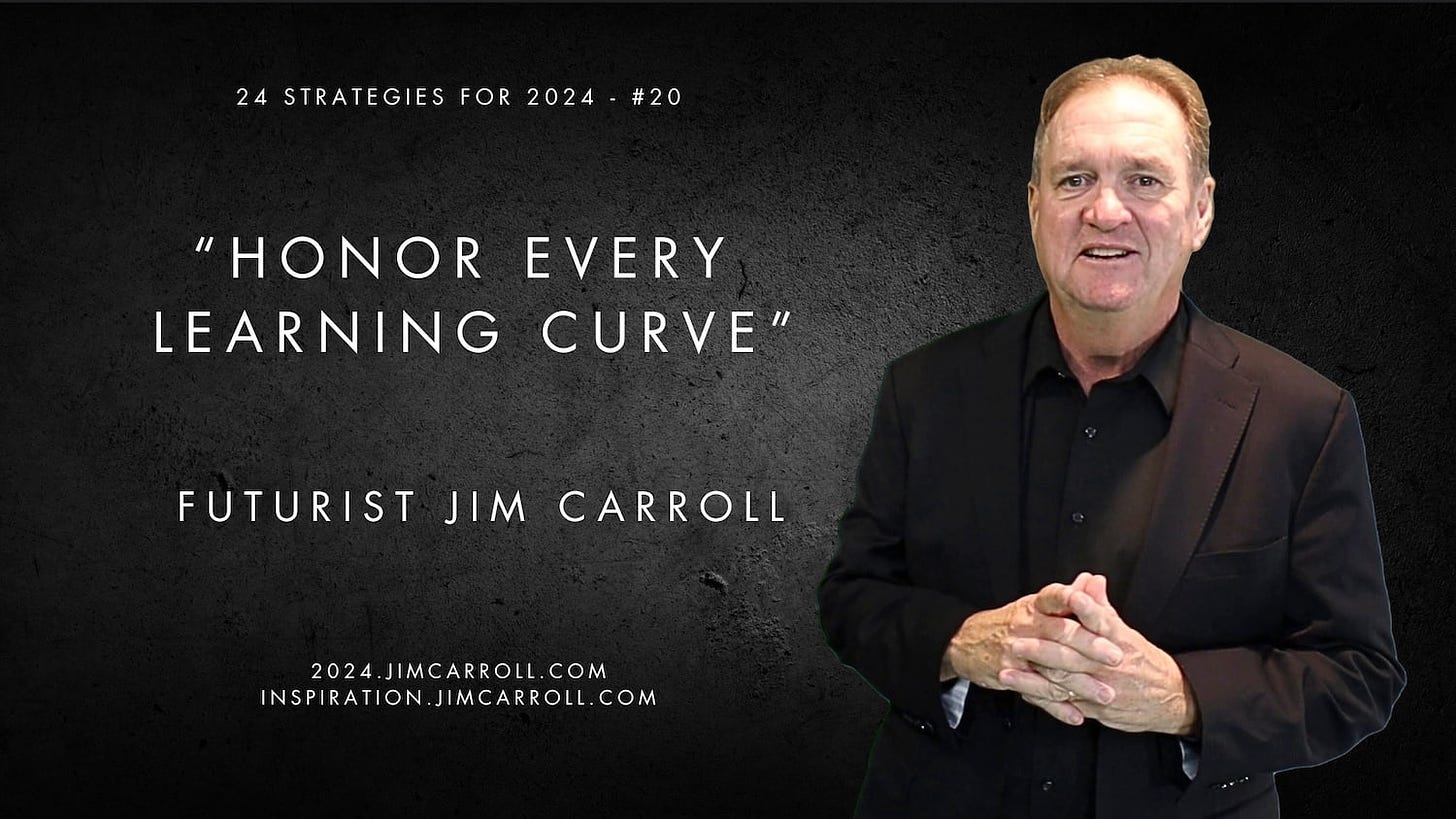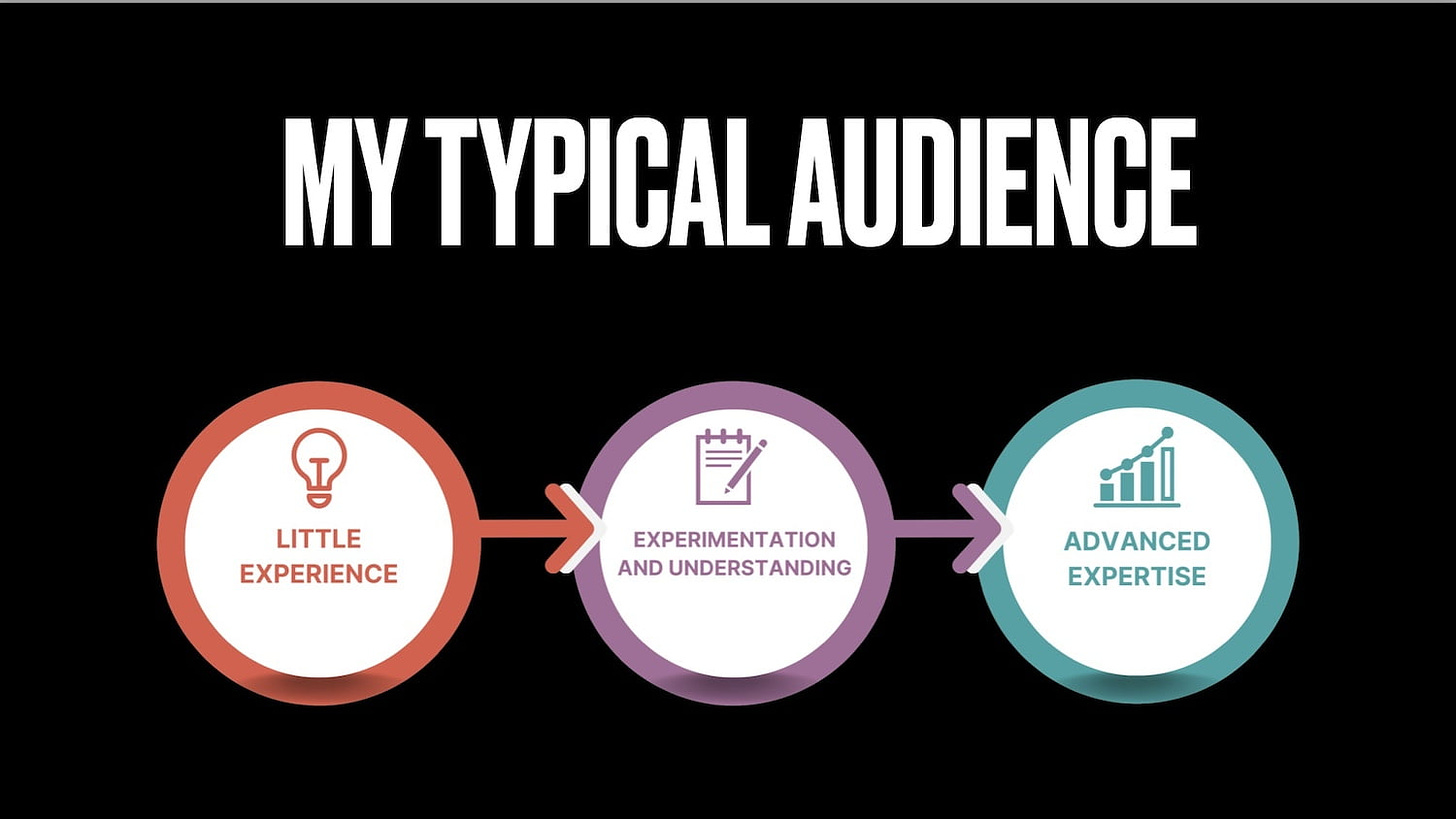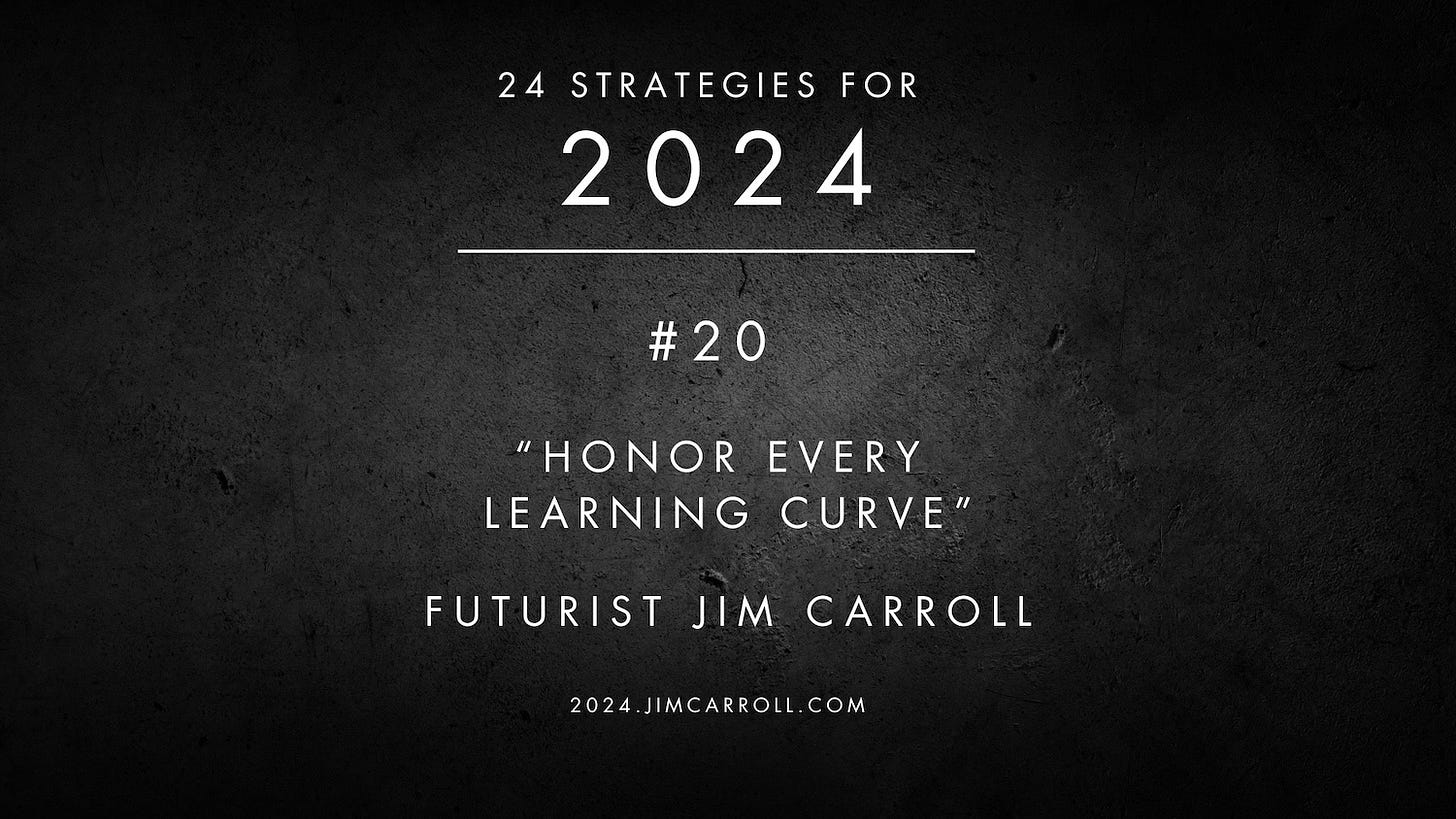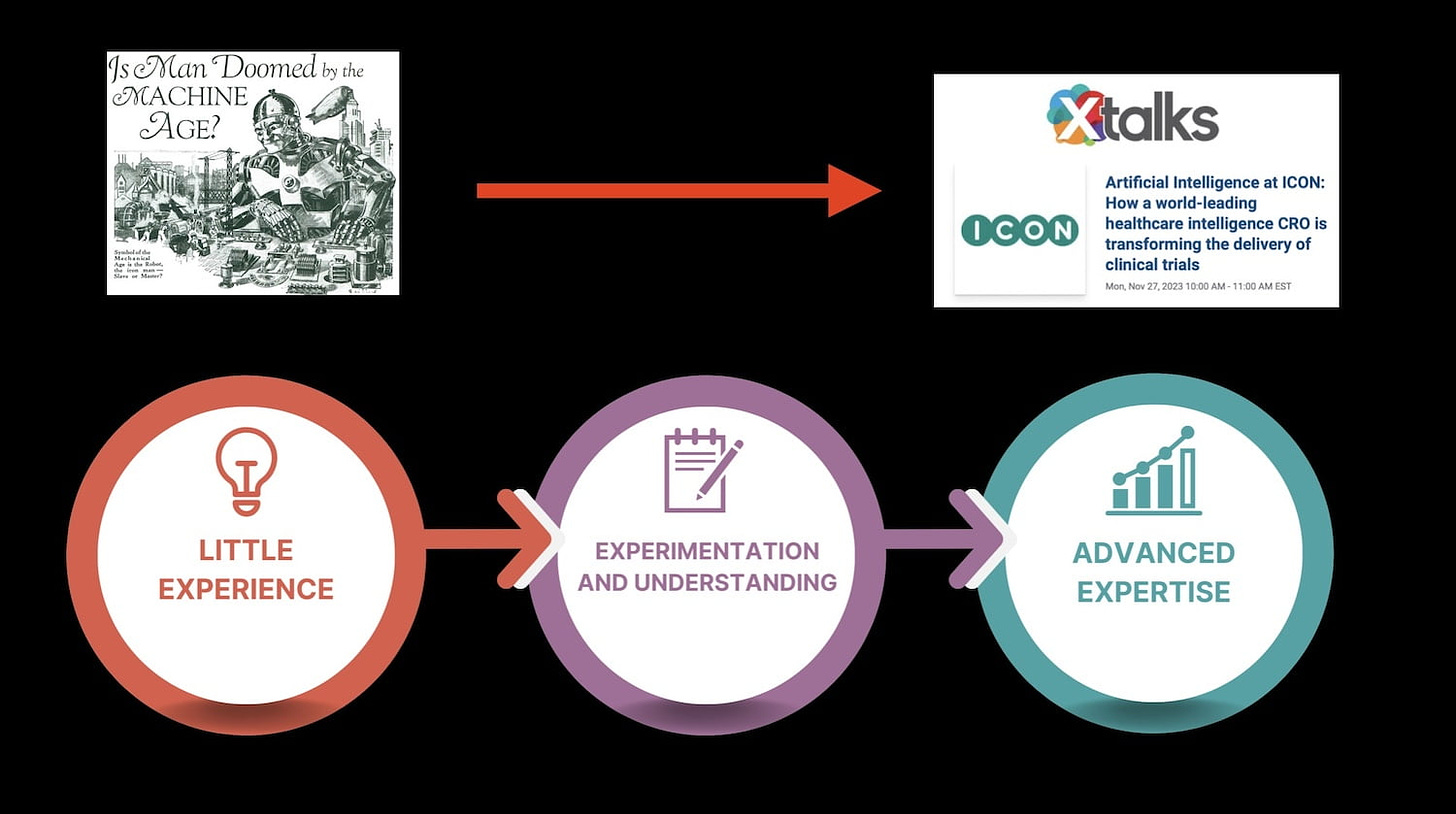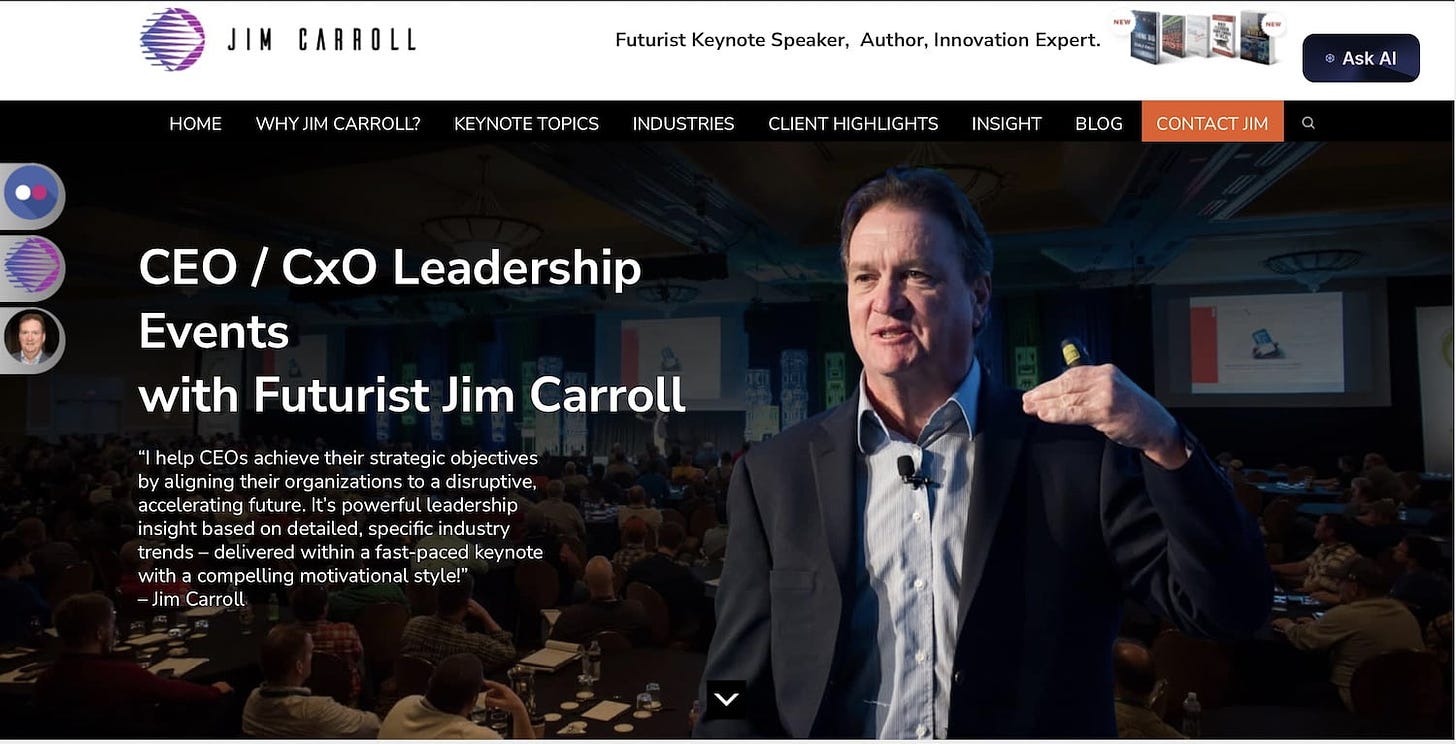Futurist Jim Carroll is running a series that began November 27, 2023, and will end on January 1, 2024 - '24 Strategies for 2024.' Rather than running a trend series for the upcoming year as he has previously, this series will examine a number of his personal beliefs on how to best align yourself with the future. There will be a post each weekday, excluding weekends and holidays, until the series runs its course. You will find it on his blog at https://blog.jimcarroll.com or https://2024.jimcarroll.com
As we head into the Christmas break, I wanted to wish everyone both a wonderful Christmas and a joyous holiday break! I went into my home broadcast video yesterday, and filmed for you this short little clip!
I will be spending my days off with my wonderful wife Christa, my sons Thomas and Willie, and their wives Kim and Laura. If we manage to finally get a little bit of winter happening, we'll be up at our chalet hoping to get a few runs in. I had briefly considered pausing this series until after January 1, but realized that if I've got the momentum to get to Strategy 24 in this series by that date, I might press on! As a result, next Wednesday, Dec. 28th, I'll put out strategy #21. onwards!
With all that in mind, Merry Christmas! Happy holidays! May you find much joy in all of your moments!
Everyone is different - respect that fact, and the rest follows.
That's one of the most important things that I have come to learn over the years within my job.
Think about it - the diversity of the ability of people to adapt to tomorrow is massive - and if you can't respect and acknowledge that, your effort to take people there will sputter and fail. The level of knowledge that people might have concerning any particular topic will be vast; their ability to comprehend what it means will vary widely; and their actual ability to learn about and understand the nature of the topic or trend at hand will span the spectrum.
That's why, every time I go on stage in front of an audience with any type of topic, I know I've got a vast range of expertise, knowledge, understanding, and experience with the topic in the room. I try to acknowledge that fact upfront.
In effect, I always try to respect the diversity of knowledge within the room (as well as diversity in general.) I know that everyone solves problems in different ways and at a different pace, each having their own learning style., For many, it can be a fast process to move from novice to expert; for others, excruciatingly long. Some people set out to deliberately master tomorrow, today - for others, their process is slow but steady. In addition, I know that the setting matters - some organizations create a culture and environment that encourages learning, adaptation, and change; others feature a leadership style of culture that will stifle any attempt to move away from the current day and the status quo.
What I've come to learn to do, in over 30 years of shaping and changing the attitude of people toward tomorrow and the trends that will take them there, is to try to honor the many different trains of thought and levels of expertise in the room. That's why this is strategy #20 of my 24 Strategies for 2024 series - honor every learning curve.
I was reminded of this reality yesterday during a planning call with a client that I will spend time with early in the New Year. To address the issue up front, I've worked this variation of the slide into my deck.
The topic in the room, of course, will be AI; my role is to be there to open the leadership meeting of this global organization, a role I undertake in many CEO-level events. I detail this within the page on my Web site that describes what I do:
“I help CEOs achieve their strategic objectives by aligning their organizations to a disruptive, accelerating future. It’s powerful leadership insight based on detailed, specific industry trends – delivered within a fast-paced keynote with a compelling motivational style!”
That's my niche - it's all detailed at https://ceo.jimcarroll.com
What I have learned over the years is that a part of the art of doing what I do is to be respectful of my audience, mindful of its diversity, and understanding of its vast range of expertise. After all, I am dealing with a touchy and often difficult topic - their very own future - and know that all will react to what I have to say differently. Some will view my message as being one full of opportunity; others will view both me and my message with hostility, angst, worry, and concern. If I did not respect that fact, I wouldn't be able to do my job.
In this particular case, the situation with AI is common. At one end of the extreme, we will have some people (in this case, a minority), who view the topic through the lens of fear, worry, and concern - they are convinced that AI is out to destroy their world, company, and industry. They have been listening intently to the quite wrong media spin that every job is at risk of being lost to AI - and they will be worried about their own. Their entire worldview on the topic is shaped by the idea found in the image above - an article from a 1940s science magazine that "man is doomed by the machine age." They might view my message with the hostility that shapes their view of tomorrow in general, and their fears specifically. They are difficult to reach.
At the far other end of the spectrum will be the small, core group of people who are already deeply immersed in all aspects of AI, working with various projects to accelerate the opportunity it presents to the organization. Several weeks ago, as a part of preparatory work, I sat in on a webinar they held for clients on the topic, and it's pretty evident they are far along the knowledge and experience curve. My message for them? They'll be of the mindset, 'but we know that already.' They will view my message with a dispassionate eye; there is not much I might be able to tell them about the topic itself, but I will attempt to reach them that they must pay attention to so much more than the topic itself - they must honor the learning curve of others.
And then in the middle of this spectrum will be the vast number of employees in the audience - they know that something important is happening, that there are strategies to be pursued and knowledge to be gained. Most will be working and playing with technologies like ChatGPT as a necessary part of the investment to get to tomorrow. They will listen eagerly to my message, hoping to accelerate their knowledge.
In crafting my talk, I need to be cognizant of all these viewpoints - and must ensure that I honor all the different levels of expertise and variations in core learning within my talk. That's often not very easy to do - but critical to do if I am to have any form of success. You need to be thinking about the same type of thing, regardless of what you do and your function, role, and responsibility. If you are reading this post, it's pretty clear that you too are trying to align people to tomorrow - and acknowledging the range of expertise and ability to learn is critical.
Part of the challenge is coming up against the popular wisdom that we can take everyone to the same place if enough time is invested; the myth of the 10,000 hours concerning expertise development sets a level of expectations that can often not be met. There are many different reasons why the ability of people to learn and adapt varies, ranging from different educational and skill backgrounds, and different pathways with professional development, Then there are cultural differences - we do not serve our role well if we do not respect the fact that the actual ethnic and national diversity in the room can have an impact on the depth of knowledge and expertise level. And let's not forget the generational issue - quite simply, today's young 20-something is far more open to new and radical forms of thinking than the change-adverse baby boomer! Finally, there are different learning styles - some can grasp new ideas and concepts quickly, while others cannot.
All of this means that the ability of people to align to fast-paced technological change will vary widely; their ability to think about core issues of creativity that are tightly linked to innovation will differ; as will their entire attitude toward the topic of change. Your job is to motivate them to adapt, engage with them to get involved, and encourage them to change. That's not easy - at all.
So what do you do about this?
Honor their learning style; be honest about tomorrow; speak directly about both the opportunities and challenges; acknowledge the worry and concern of some while ensuring that others understand why you are doing so. Over the years, I've come to realize that the nature of my job is sometimes just ... weird. When I am on stage or sharing my insight through blog posts or other methods, I am encouraging change and adaptation. Whether I am trying to change anything - new processes, ways of doing things, ideas, adaptation to new business models - or when trying to introduce new technologies - AI and such - there are always people who have different levels or depths of expertise.
I need to be respectful that everyone has a different level of understanding, so some might find any change easy, others hard; some might understand a new technology, while others are fearful.
I must honor every learning curve.
You should too - and make this a core part of your strategy for 2024.
Futurist Jim Carroll has a learning curve and knowledge ingestion style that involves much impatience with the process.



